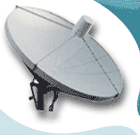
|
A Satellite Broadcast Discussion It had come to the point where it was necessary to put thoughts together for the benefit of technology and the technology user. The only viable options were either a paper delivered in a session at a conference or convention, where the audience would undoubtedly be limited in number, or the creation of something more grandiose and appealing which would serve a larger public. I chose the latter. The grant proposal I wrote for the resurgence of the Tucker Multimedia Center at Washington and Lee University in Lexington, Virginia, USA, therefore, had to include a component which called for a discussion group whose sole purpose would be to parley and evaluate technology use in teaching and would determine the direction technology must take in its ongoing revolution for identity in the classroom. The only way to reach a following of significant size was to structure the discussion around the use of satellite and web technologies. Thus, the concept gave birth to the Baker's Dozen Discussion Group to be composed of leading educators from across the continent and to be broadcast via satellite and video streamed around the world. The teleconference was unique in conception and hastened to delve into the many areas where questions arise in technology use, development, and assessment. The primary areas of discussion were methodologies and applicability of technology in the classroom. Emphasis in the discussion was theory and practices using technology, expected and assured outcomes with technology use, the changes in knowledge acquisition as it pertains to the technological interface, and the integration of technology into the teaching and learning processes. For the purpose of the broadcast and this web site, technology is being defined as the ways in which the computer and its elements can be used to enhance the experience of both teachers and students in various educational contexts. Since the expertise of many of the participants in the discussion group is in the teaching of language, culture, and literature, specific examples in the discussion are rooted in those fields. Many of the same principles apply to other areas in the humanities and beyond, however. I invite you to browse this site. If you have a particular strategy or method or means of applying a technological tool from which others might profit, share your knowledge with our readers. Perhaps you would rather tell others about some of your experiences surrounding technology. Or maybe you just want to read what the experts say, and wish to gain insight into the mysterious realm of technology. Whatever the case, keep checking back as Technology: Tool or Method? will be undergoing constant changes and updating to keep you, the educator, completely informed. Dick Kuettner |
2001-2008 © Technology: Tool or Method? - Washington
and Lee University - Tucker Multimedia
Center
Contact:
toolormethod e-mail

